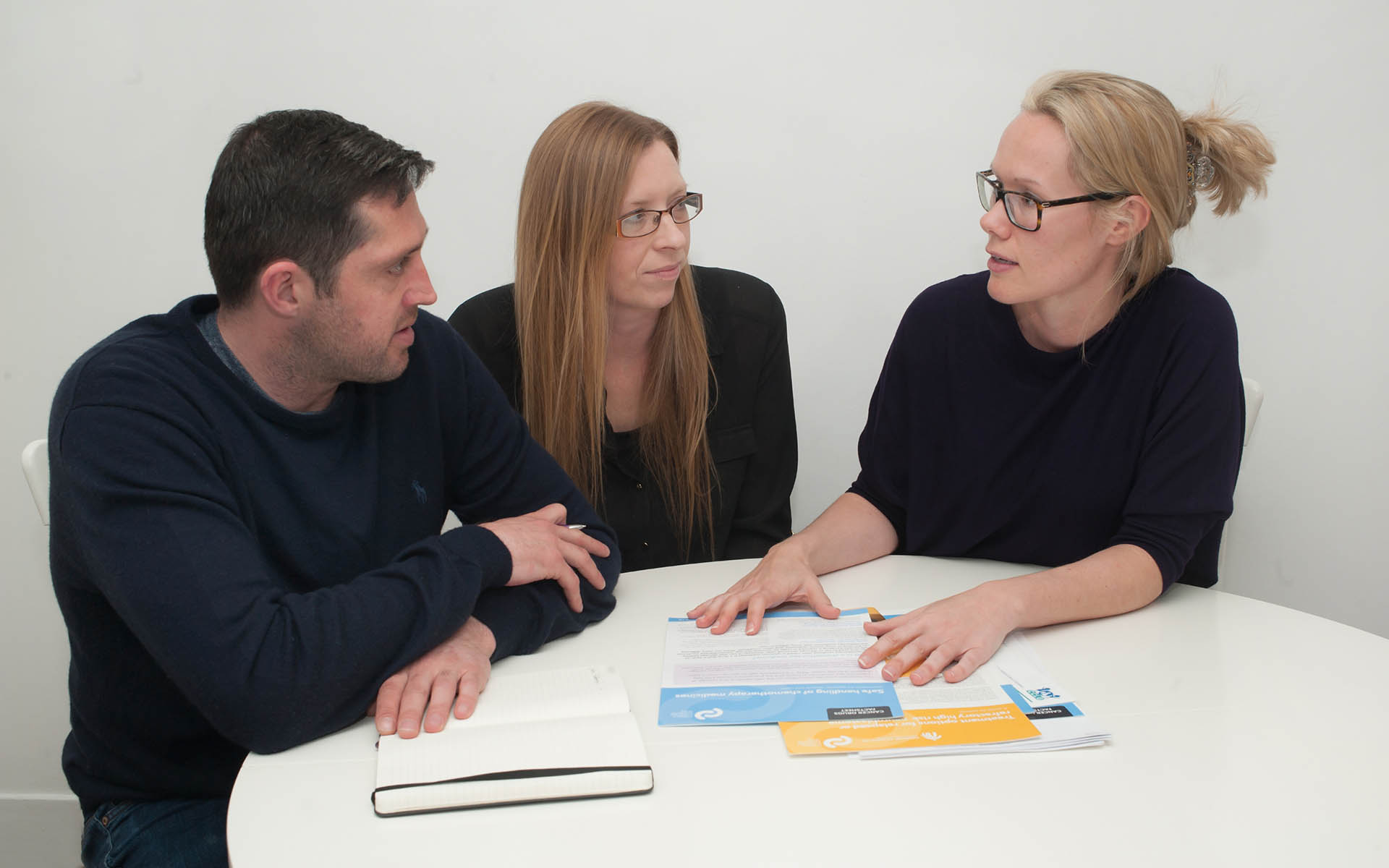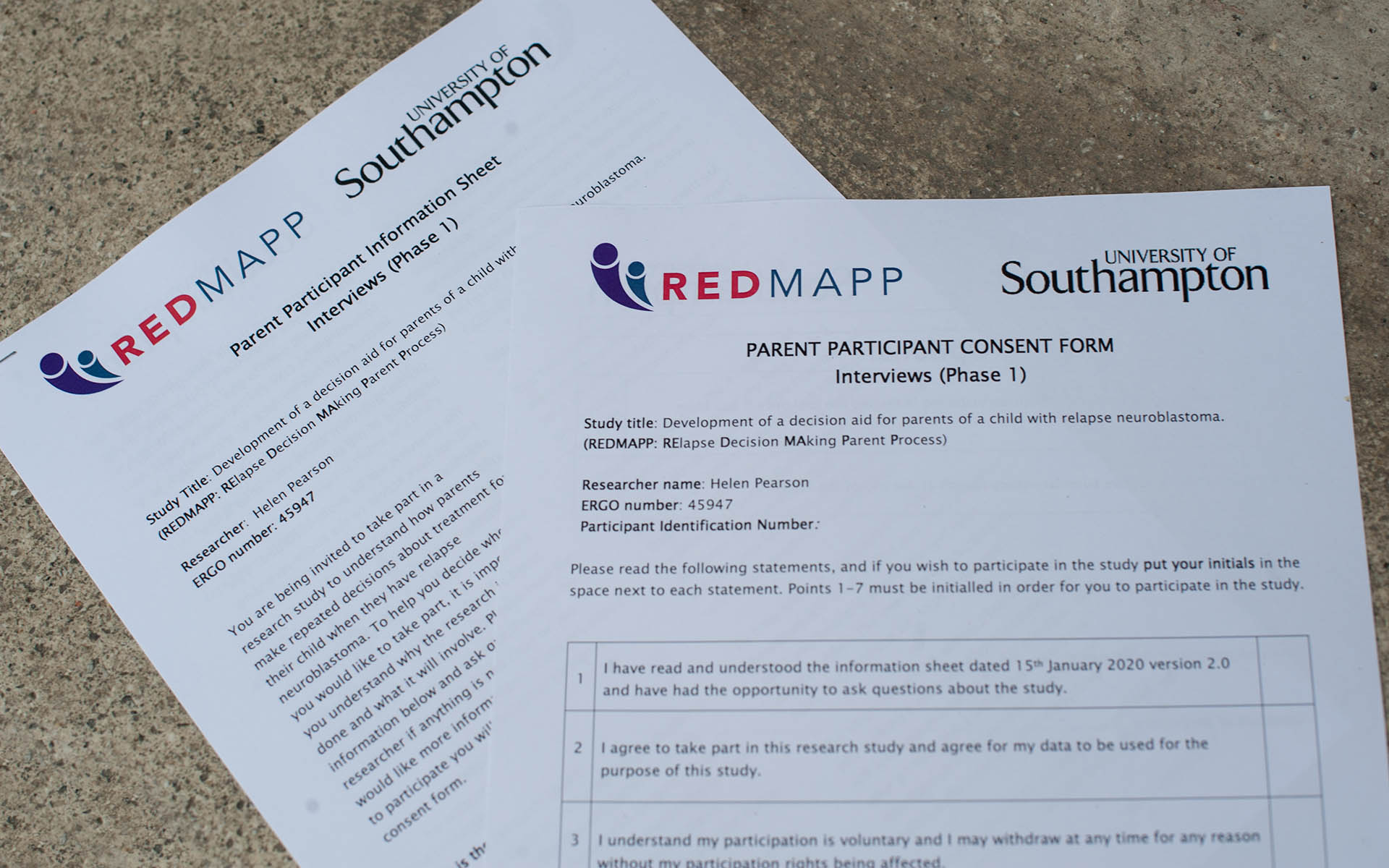Phase 1 *Closed to recruitment in September 2022*
Who is this study for?
The study is looking for parents of children who are receiving treatment for relapse or refractory neuroblastoma and are making decisions about treatment.
For children diagnosed with high-risk neuroblastoma in the United Kingdom current treatment is either the Children’s Cancer Leukaemia Group Guidelines or High-Risk Neuroblastoma 2 Protocol.
The study has the following definitions:
Relapse disease can be at any stage (either on or off treatment)
Disease is termed refractory if there is an inadequate response following induction chemotherapy. Children can then receive treatment as per the VERITAS protocol. Refractory disease where treatment deviates from this pathway and there is a treatment decision to be made can be included. This includes patients with progressive disease.
What is involved in participating?
Parents of a child with relapsed or refractory neuroblastoma who have recently made a decision about treatment can take part in an interview. The purpose of these interviews is to understand how parents made their most recent treatment decision and how their decision-making may have changed over time (if they have made previous decisions about treatment). This will build a picture of how parents make a series of repeated treatment decisions to inform the decision aid (phase 2).
Parents will be interviewed at different decision points following relapse or disease progression (as defined above) where a treatment decision has been made. A need for a treatment decision can be related to anything which requires a change to the treatment a child is currently receiving for example treatment toxicity, partial response or progressive disease.
What is the criteria to be able to participate?
- Parents of a child who is receiving treatment for relapsed or refractory neuroblastoma (except those on VERITAS)
- Child is under 12 years of age. This is because there is decision-making research involving those who are 12 years and over. As this is a decision aid for parents, children are not being interviewed.
- Parents can be re-interviewed if they make more than one treatment decision during the time phase 1 is open

How will parents be asked to participate in the study?
Parents can participate in the study via 2 routes:
1) Participant Identification Centres (PIC): Parents will be approached about REDMAPP by a healthcare professional in their Primary Treatment Centre if the centre has agreed to be a PIC. PICs are centres which identify potential participants for research studies and then the research is undertaken by an independent research team (see Research Team page). Parents will be given a parent information pack which contains information about the study and asked whether they would be happy for Helen Pearson to contact them to discuss the study. If parents agree to be contacted, they will be asked to sign a consent form to allow their contact details to be shared with Helen. The healthcare professional will then forward these details (name, phone number and email address if applicable) to Helen. Parents will be contacted by Helen a minimum of 24 hours after she has received the parent contact details. This gives time for parents to review the parent information pack. When Helen contacts the parent it is to discuss the study further and answer any questions they may have. Parents can then decide to participate or decline being involved in the REDMAPP study. Speaking with Helen does not mean parents have to participate.
Participant Identification Centres:
There are 12 Primary Treatment Centres who are participating in phase 1:
- Alder Hey Children’s NHS Foundation Trust
- Cardiff and Vale University Local Health Board, University Hospital of Wales
- Great Ormond Street Hospital for Children NHS Foundation Trust
- Manchester University NHS Foundation Trust
- Oxford University Hospital NHS Foundation Trust
- Royal Aberdeen Children’s Hospital (NHS Grampian)
- Royal Hospital for Children, Glasgow
- Royal Marsden NHS Foundation Trust
- Sheffield Children’s NHS Foundation Trust
- The Leeds Teaching Hospitals NHS Trust
- University Hospital Bristol and Weston NHS Foundation Trust
- University Hospital Southampton NHS Foundation Trust
Parent Self-Referral to REDMAPP:
2) Parents who may like to participate in the study and their Primary Treatment Centre is not listed as a PIC are able to self-refer to the study. Parents can self-refer either through completing the contact form below or by direct message on @redmapp_study twitter or Instagram page or Research Study Facebook page.
This self-referral means Helen can send the parent information pack to the email address provided and arrange a follow-up phone call to discuss the study a minimum of 24 hours later. This gives time for parents to review the parent information pack. When Helen contacts the parent it is to discuss the study further and answer any questions they may have. Parents can then decide to participate or decline being involved in the REDMAPP study. Speaking with Helen does not mean parents have to participate.

What happens if a parent agrees to participate?
If a parent agrees to participate in the study, an interview will be arranged at a time which is convenient for the parent. This can be by telephone or video call (ie: Zoom or Microsoft Teams). The interview date/time will be organised at the time a parent agrees to participate in the study (this would be when the parent and Helen speak to discuss the study). Consent will be taken at the time of the interview. A copy of the consent form is in the parent information pack so parents can read this in advance to understand what they are consenting to.
The interview has questions around what is important when making treatment decisions, who is involved in making these decisions and whether with the more decisions parents make their views change in how they make these decisions. The questions are a guide to start the interview and the conversation will be directed by what parents want to discuss around their decision-making experiences.
We encourage both mothers and fathers, who are involved in their child’s care, to participate as we know from previous research literature that the experiences of fathers is under represented.
What is the summary from the work in phase 1?
Thank you to the parents who shared their experiences of making treatment-related decisions. Eighteen parents participated in phase one. This consisted of 12 mothers and 6 fathers. Parents had made between one and six treatment decisions. Three parents were interviewed twice. The analysis of this work is ongoing.
